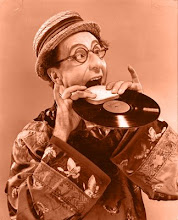Wynn, Lose, or Draw...

Pop Culture Gadabout Bill Sherman has written a spiffy review of Ed Wynn's debut talkie, Follow The Leader (1930). Bill speculates that Wynn's early 30s radio success was behind the scarcity of movie roles during that decade (a mere two films). He's right, but not because Wynn lacked the desire to make a name for himself in movies (he had jumped at the chance to make a silent, Rubber Heels, in 1927). Radio propelled Ed Wynn to national stardom, but it not only murdered his chances in film in the 1930s, it practically wrecked his career and his life.
The amiably goofy Follow the Leader is a nice example of what might have been had Wynn not hit it big with The Texaco Fire Chief in 1932. Suddenly, Ed Wynn as "The Chief" was everywhere, his face and radio catchphrase (a ridiculously drawn-out "sooooooooo-o-o-o" emitted when Ed forgot his lines) were plastered on toys, games, and books. As his son Keenan Wynn said years later, "Suddenly he was locked into coming up with 55 jokes every week." Although Wynn found himself five grand a week richer, the strain of the radio program had a devastating effect on his marriage and health. When Ed Wynn signed with MGM in 1933, it was to make a film that capitalized on his radio program. The Chief was a typical MGM botch job. Wynn's silly loony was reduced to a pitiable oaf, the inept son of a respected town fire chief who wants to follow in his father's footsteps. Critical response was devastating. If the film had been a success, Wynn might have had a fighting chance to ditch radio. Unfortunately, the film's poor reception only hastened his downfall. His image and personality had reached levels of over-saturation that weren't possible for celebrities in the days before radio. His ratings plummeted and by 1935 he was not only off the air, he was virtually unemployable*. Ed Wynn was forced into early retirement by 1937 and sank into a deep depression that ended his marriage. Happily for Ed, his engaging, off-the-cuff silliness and his ability to work a crowd made him a natural for early television. His TV success helped kick-off the second phase of his career which included dramatic roles on Playhouse 90, his appearance in Mary Poppins, and his 1959 Academy Award nomination for his role as Albert Dussell in The Diary of Anne Frank.
*The same thing, more or less, would happen to burlesque comic Joe Penner just a year or two later. Penner was a national sensation on The Baker's Broadcast in 1933 with his non-sequitur catchphrase "Wanna buy a duck??", but audiences cooled quickly. Like Wynn, Joe Penner inspired dozens of toys and games. But Penner didn't have anything approaching Ed Wynn's talent or range, so when people tired of the catchphrase, he was effectively finished for good. Joe Penner didn't even have a chance at a comeback as he died in 1941 at the age of 36.





0 Comments:
Post a Comment
<< Home